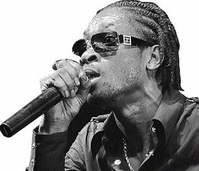Early days to assume deejay reparations deficiency
Published: Sunday | November 1, 2009

Bounty Killer is one of few dancehall artistes tackles the issue of repatriation with 'Rodney Intention'. - File
At a glance, the Preliminary Reparations Discography compiled by Garth White is strikingly short of deejays. There is Burning Spear's Slavery Days, The Abyssinians' Declaration of Rights, Peter Tosh's 400 Years, Slave Driver by Bob Marley and the Wailers, Redemption Song by Bob Marley, African Hellocaust by Jagu Peke Yungu (Everton Bird) and Reparations Due by True Alpha, the last in the process of being mixed and produced.
Only at the very end do the deejays (and, by extension, dancehall) make the cut with songs by Bounty Killer and Damian 'Junior Gong' Marley. In addition, the other songs on the preliminary list are largely from earlier eras of Jamaican music.
Still, White said this imbalance does not necessarily indicate that latter-day dancehall deejays are ignorant of or ignoring the issue of reparations. "It is early days. I don't know what I will buck up," he said.
conscious approach
He said "we ought to be able to find some dancehall songs like that (about reparations) though, in all fairness, the focus of dancehall is not quite on reparations." White pointed out that the conscious approach to Africa is very much a part of dancehall. "The performers' attitudes to Africa are still different from what is the norm in the society," he said.
White is confident that as he researches further there will be more dancehall songs when 'Preliminary' is dropped from the Reparations Discography.
He said that while some of the songs do not mention reparations specifically, they are still in the mood of the debate. So in Declaration of Rights the Abyssinians state the situation:
"Took us away from civilisation
Brought us to slave in this big plantation
Fussing and fighting, among ourselves
Nothing to achieve this way, it's worser than hell, I say"
And they issue the call to action (though not stating specifically what that action is):
Get up and fight for your rights my brothers
Get up and fight for your rights my sisters"
Tosh focuses on length of time and an unchanged situation in 400 Years with:
"400 years
And it's the same
The same philosophy"
Burning Spear speaks to memory, asking "do you remember the days of slavery?" while Slave Driver speaks to a reversal of relationships with "slave driver, the table has turned/catch a fire, so you will get burn".

















